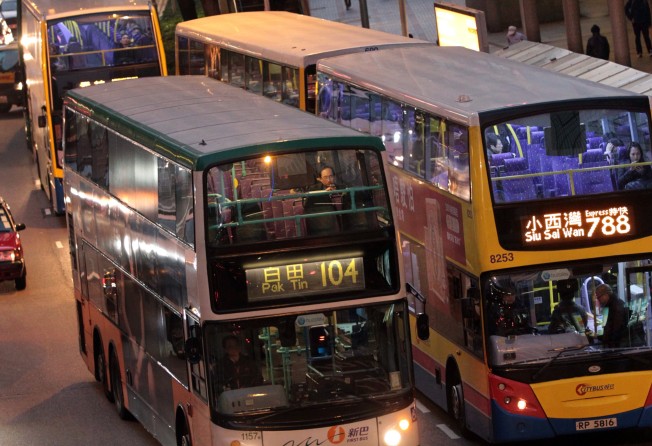
Online Letters, September 26, 2017

Working hours for bus drivers are far too long
Transport workers’ unions are calling for a reduction in the maximum hours worked by bus drivers in Hong Kong, from 14 to 12 hours. The Transport Department recommends that 14 hours should be the maximum allowed.
One major obstacle to making this happen is that the city’s bus operators face a serious manpower shortage. According to one poll from last year, 97 per cent of bus drivers work overtime, 78 per cent saying they work between 50 and 60 hours a week. If this shortage is not dealt with and drivers keep putting in long hours, there is a greater risk of accidents.
If they are regularly doing 14-hour days I do not think they are getting enough rest. They might only be able to catch six or seven hours sleep at night, which is not enough. It is certainly not good for a driver to start a long shift if he is already tired. It does not matter what you are doing or whatever vehicle you are driving, if you are tired it raises the risk of you falling asleep behind the wheel and obviously there could be serious consequences.
Therefore, I support the call by the unions for bus firms to establish a new rule of nor more than 12 hours per shift. If the companies back this rule and publicise it then this will give passengers some peace of mind and they will feel accidents are less likely to happen.
Christy Chung Chi-ching, Yau Yat Chuen
It will take time to get rid of all discrimination in Hong Kong
Discrimination remains a serious problem in so many societies around the world. Governments in different countries have implemented a number of measures to try and deal with the problem, but so often they fail to achieve their objectives and some forms of discrimination remain firmly in place.
Entrenched views in a society are difficult to change, even if legislation is passed. Ignorance can be prevalent and traditional views remain that go back centuries. So in some developing nations, despite laws, women are still treated like second-class citizens and their communities offer no protection against discrimination. For example, in India, traditional beliefs still mean that many women do not enjoy equal treatment.
Another form of discrimination in many societies is against people depending on their sexual orientation. Citizens from the lesbian, gay, bisexual and transgender community are often treated as outsiders and face discrimination in different ways.
While I can understand the relevance of legislation, it is important to change attitudes and that will not happen overnight. It will take time to end discrimination. I think the key is education, with young people being taught to accept differences in race and sexuality. With some adults, traditional prejudices are so entrenched that even education is unlikely to change their attitudes. But as young people are taught the importance of opposing discrimination, hopefully they will grow up as tolerant adults.
Of course, education alone will not solve everything. Governments will still need to introduce legislation outlawing discrimination of all kinds in the workplace and in society. Hopefully we will see future generations having more enlightened attitudes.
Michael Ke, Tseung Kwan O
Work ethic of Chinese is evident in country and all over the world
Diego Gilardoni (“Learning from China: three lessons for the ignorant West”, September 1) attributes China’s rapid ascent to its wise focus on long-term outcomes, its emerging global outlook and tolerance of ambiguity during politically turbulent times. It would be remiss to not mention the country’s gain in economic might being underpinned by the phenomenal work ethic of Chinese people.
Diligence, perseverance and striving for success are culturally ingrained centuries-old Confucian values that endure to this day. Mainland and overseas Chinese are renowned for working hard and never giving up even in adversity. The economic, academic and professional ascent of immigrants from China to the West (and their descendents the overseas-born Chinese) over the century and a half testifies to the intergenerational imprint of our fierce drive to do better than our forbears. Chinese everywhere want to leave a positive legacy for those that come after us. From San Francisco to Sydney and Shanghai, Chinese-run shops and restaurants remain open for business for long hours, often seven days a week.
The pressure cooker to excel is relentless. Unlike in Australia where I live, China offers a limited social security safety net. There is simply no option but to work hard to provide for one’s family. There is deep shame (some argue this to be a negative dynamic) in relying on personal and government handouts. This is not totally a bad thing, as welfare is then not casually treated as an intergenerational expectation and entitlement, with consequent devaluation of services such as health care, subsidised child care, education and subsidy schemes.
Carefully rationed social security then becomes an equitable means of redistributing precious government income as a safety net to get out of strife. This prevents the abuse of social and financial altruism in China becoming a permanent fixture that entrenches dependency in the advanced economies of the West.
Joseph Ting, Brisbane, Queensland, Australia
Study hours cap would enable students to have more free time
I think there is no doubt that academic pressure is the main reason for students in Hong Kong committing suicide.
If you want to get a place at one of the local universities you must do well in the Diploma of Secondary Education (DSE) and so the competition for one of these undergraduate places is fierce. Therefore students set themselves targets and for those who want to become undergraduates doing badly in the DSE is simply not an option. This causes these youngsters a great deal of stress and to make sure they do not fail they have to complete a very heavy workload.
I arrive at school at 8am and have lessons from 8.20 until 3.45pm. After school, I need to attend tutorial classes and go back home for dinner. Then I need to finish all my homework and if I have time I will do some revision, and then sleep. I do not have any leisure time and believe that most students in Hong Kong have similar experiences. I can understand why some youngsters have psychological problems.
I agree with those who want the government to have a cap with standard study hours. This would ensure that students had at least some leisure time and did not have to focus all their attention on their studies. Hopefully they could rest more and get a good night’s sleep.
I do hope the government will give serious consideration to this suggestion. If students are under less pressure then I think the suicide rate will drop.
Jocelly Tse, Hang Hau

Clinton blaming everyone but herself for election loss
Hillary Clinton is a serious, if flawed, public servant. One of her problems is that, along with many liberals, she exists within an opaque bubble. The bubble provides comfort, elitism and ideological snobbery as reflected in the desire to castigate the source of objectionable ideas that rattle and roil progressive comfort zones rather than tackle the ideas exclusively. Thus, her characterisation of Trump supporters as deplorable and irredeemable.
Her latest book-length attempt (What Happened) to deflect much responsibility for her historic loss in the US presidential election in November, exemplifies this disreputable practice as she blames Vladimir Putin, James Comey, Bernie Sanders, you and me and the bogeyman behind the tree.
The postmodern progressive cannot be wrong and cannot be shamed. If a favoured electoral platform fails to carry the broader population, it is never because the ideas are flawed, but rather because it was not explained effectively, torpedoed by nefarious enemies or, as likely, the stupidity of the non-bubble crowd.
Paul Bloustein, Cincinnati, Ohio, US